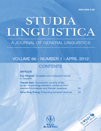
STUDIA LINGUISTICA
Scope & Guideline
Advancing Knowledge in Linguistics and Language
Introduction
Aims and Scopes
- Syntactic Theory and Analysis:
The journal explores various syntactic structures and their theoretical implications, often employing cross-linguistic comparisons to illustrate syntactic phenomena. - Semantics and Pragmatics:
Research published in the journal delves into the semantics of linguistic expressions, including vagueness, implicature, and the interplay between semantics and pragmatics in language use. - Cross-linguistic Studies:
A significant portion of the journal's contributions involves comparative studies across languages, highlighting unique linguistic features and universal principles. - Corpus-based Research:
The journal frequently includes studies that utilize corpus analysis to examine linguistic data, providing empirical evidence to support theoretical claims. - Language Acquisition and Development:
Articles often address how language is acquired and developed, particularly in diverse linguistic environments and among different age groups.
Trending and Emerging
- Pragmatic Ambiguity and Contextual Interpretation:
There is an increasing emphasis on the role of pragmatics in understanding ambiguity and meaning in language, showcasing a trend towards exploring how context influences linguistic interpretation. - Experimental Linguistics:
Recent papers highlight the use of experimental methods to investigate linguistic phenomena, indicating a growing trend towards empirical approaches that validate theoretical claims through data. - Interface Phenomena:
Research exploring the interfaces between syntax, semantics, and phonology is on the rise, reflecting an interest in how different linguistic components interact within various languages. - Language Variation and Change:
An increased focus on language variation, particularly in relation to social factors and dialectal differences, suggests a shift towards examining the dynamics of language in real-world contexts.
Declining or Waning
- Historical Linguistics:
There has been a noticeable decrease in publications specifically focused on historical linguistic studies, suggesting a shift away from diachronic analyses toward more contemporary linguistic inquiries. - Morphology Studies:
Research specifically targeting morphological structures and their functions has become less frequent, indicating a potential waning interest in this area compared to syntax and semantics. - Phonological Theory:
Though phonology remains a relevant area, the frequency of papers dedicated solely to phonological theory appears to be decreasing, possibly overshadowed by more integrative approaches that combine phonology with syntax or semantics.
Similar Journals

Journal of Slavic Linguistics
Connecting Scholars through Slavic Linguistic ResearchJournal of Slavic Linguistics, published by SLAVICA PUBLISHERS, is a key academic resource dedicated to the exploration of Slavic languages and linguistics. Established to provide a comprehensive platform for scholarly research, this journal addresses the intricate dynamics of Slavic phonetics, syntax, semantics, and discourse, making significant contributions to both theoretical and applied linguistics. The journal holds an impact factor that reflects its value in the linguistic community, particularly as it is ranked in the Q4 category in Linguistics and Language for 2023. With a focus on a wide range of topics within the field, the Journal of Slavic Linguistics serves as an essential reference for researchers, educators, and students alike, fostering an appreciation and deeper understanding of Slavic linguistic phenomena. Although currently not an Open Access journal, it remains accessible to a broad audience keen on engaging with contemporary linguistic scholarship.

Snippets
Exploring the frontiers of knowledge across diverse fields.Snippets is an esteemed academic journal published by LED EDIZIONI UNIV, known for its commitment to advancing knowledge across various disciplines. The journal, which carries the ISSN 1590-1807, serves as a crucial platform for researchers, professionals, and students in the fields of humanities, social sciences, and applied sciences. With an increasing emphasis on open-access content, Snippets offers a wealth of information and insights aimed at fostering academic dialogue and innovation. Although specific metrics like impact factor and H-index are yet to be established, the journal is dedicated to providing high-quality research outputs that contribute to the enrichment of scholarly pursuits. Based in Milan, Italy, Snippets welcomes contributions from a diverse range of perspectives, thus enhancing interdisciplinary collaboration and promoting a deeper understanding of contemporary issues.

SKASE Journal of Theoretical Linguistics
Expanding the Frontiers of Linguistic ThoughtSKASE Journal of Theoretical Linguistics, published by the SLOVAK ASSOCIATION STUDY ENGLISH-SKASE, is a distinguished Open Access journal that expands the horizons of linguistic research and theoretical frameworks. With its ISSN N/A and E-ISSN 1336-782X, the journal has established itself as a pivotal resource for scholars in the field, achieving a commendable Q2 ranking in Linguistics and Language as of 2023. The journal, which has been in continuous publication since 2017, actively publishes innovative research studies, reviews, and theoretical discussions, easing access to groundbreaking work for academics and practitioners alike. Based in Slovakia, it connects a rich heritage of linguistic scholarship and is indexed in Scopus, ranking alongside its peers in both Arts and Humanities and Social Sciences categories. The SKASE Journal of Theoretical Linguistics is crucial for anyone interested in the evolving landscapes of linguistics, serving as an invaluable platform for disseminating knowledge and fostering collaboration amongst researchers worldwide.

Journal of Portuguese Linguistics
Navigating the Complexities of Portuguese LinguisticsThe Journal of Portuguese Linguistics is an esteemed peer-reviewed academic journal published by UBIQUITY PRESS LTD, dedicated to the exploration of the rich complexities of the Portuguese language and its various linguistic dimensions. With an ISSN of 1645-4537 and an E-ISSN of 2397-5563, this open-access journal has been disseminating valuable research since 2002, ensuring that knowledge is accessible to all scholars, professionals, and students interested in Linguistics. Based in Portugal, it features a distinct focus on the linguistics pertinent to the Portuguese language, facilitating discussions that span theoretical and applied interests. The journal holds a respectable Q3 quartile rank in the field of Linguistics and Language, reflecting its growing significance and contribution to academia, as evidenced by Scopus rankings that place it in the 71st and 68th percentiles in Arts and Humanities as well as Social Sciences. Researchers and practitioners alike will find Journal of Portuguese Linguistics to be an indispensable resource for fostering discourse and innovation in the study of language.
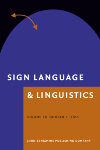
Sign Language & Linguistics
Celebrating Two Decades of Linguistic ExcellenceSign Language & Linguistics is an esteemed academic journal published by John Benjamins Publishing Co, dedicated to advancing the field of sign language studies and linguistics. With an ISSN of 1387-9316 and an E-ISSN of 1569-996X, this journal has earned a prominent place in the linguistic community, achieving a Q1 ranking in both the Linguistics and Language category, and standing out within the Scopus rankings, placing in the 77th percentile among the Arts and Humanities and 75th percentile in the Social Sciences categories. Sign Language & Linguistics spans over two decades of research, offering comprehensive insights and analyses from 1998 to 2024, promoting high-quality scholarly communication. Aimed at researchers, professionals, and students alike, this journal is essential for those exploring the intersection of sign languages, linguistics, and cultural studies, facilitating progressive discourse and fostering an understanding of this vital mode of human communication.

JOURNAL OF EAST ASIAN LINGUISTICS
Connecting Scholars through East Asian Language StudiesJOURNAL OF EAST ASIAN LINGUISTICS, published by SPRINGER, is a premier academic journal that focuses on the rich and diverse linguistic phenomena from East Asia. With an ISSN of 0925-8558 and an E-ISSN of 1572-8560, this journal has steadily contributed to the fields of linguistics and the history and philosophy of science since its inception in 1992. Operating from its base in the Netherlands, the journal is recognized for its impactful research, holding a Q2 category ranking in both the History and Philosophy of Science and Linguistics and Language. It boasts an impressive standing in Scopus rankings, highlighting its relevance and contribution to the academic community with a 66th percentile ranking in Language and Linguistics. The journal is not currently open access, ensuring a rigorous peer-review process that elevates the quality of published articles. By bridging theory and empirical research, the JOURNAL OF EAST ASIAN LINGUISTICS plays a vital role in advancing knowledge in linguistics, making it an essential resource for researchers, professionals, and students interested in East Asian languages and their complexities.
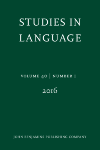
STUDIES IN LANGUAGE
Connecting Cultures through Language and CommunicationSTUDIES IN LANGUAGE is a distinguished academic journal published by John Benjamins Publishing Co, focusing on the dynamic fields of Linguistics and Communication. With an ISBN of 0378-4177 and E-ISSN 1569-9978, this journal has become an essential platform for researchers, professionals, and students seeking to advance their understanding of language and its multifaceted dimensions. The journal has been recognized in 2023 with a prestigious Q1 categorization in Linguistics and Language and a Q2 ranking in Communication, reflecting its vital contributions to these fields. Its Scopus rankings further emphasize its relevance, ranking 299 out of 1088 in Language and Linguistics, positioning it within the 72nd percentile. Published continuously since its inception in 1977, STUDIES IN LANGUAGE plays a pivotal role in disseminating cutting-edge research and fostering academic dialogue around contemporary linguistic theories and communication practices. While it is not an open-access journal, it offers valuable insights that make it a must-read for anyone committed to exploring the intricate relationships between language, culture, and society.

Voprosy Yazykoznaniya
Innovating Perspectives in Language and SocietyVoprosy Yazykoznaniya, published by the esteemed Russian Academy of Sciences and the State Academy of Humanities (GAUGN), stands as a leading journal in the field of linguistics and language studies. With an impressive Q2 rank in Linguistics and Language for 2023 and a strong position within Scopus rankings, this journal fosters scholarly dialogue and pushes the boundaries of linguistic research by providing a platform for innovative studies, reviews, and analyses. Although not open access, its publication ensures high academic standards and visibility within the global academic community. Researchers, professionals, and students alike can benefit from the rich insights and diverse perspectives presented in this journal, serving as a vital resource for anyone interested in the intricacies of language and its role in society. Operating since 2009 and continuing to 2024, Voprosy Yazykoznaniya is an essential reference point for contemporary linguistic scholarship in the Russian Federation and beyond.
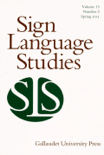
Sign Language Studies
Exploring the nuances of sign language research.Sign Language Studies is a prestigious peer-reviewed journal dedicated to advancing the field of sign language research and the linguistic studies surrounding it. Published by Gallaudet University Press, this journal stands out in the realms of Linguistics and Language, being classified within the Q2 category as of 2023, which underscores its influence and relevance within academic circles. Operating under the ISSN 0302-1475 and E-ISSN 1533-6263, the journal has a remarkable Scopus ranking that positions it in the top 20% within the disciplines of Arts and Humanities and Social Sciences, attesting to the high quality and impact of its publications. Spanning a comprehensive timeline from 2002 to 2024, Sign Language Studies invites researchers, professionals, and students to engage with cutting-edge research, theoretical frameworks, and practical studies that contribute to our understanding of sign languages, their structure, use, and the communities they serve. This makes it an essential resource for those committed to the exploration and appreciation of sign language within both linguistic and social contexts.
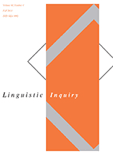
LINGUISTIC INQUIRY
Illuminating the Pathways of Linguistic ThoughtLINGUISTIC INQUIRY is a premier journal published by MIT PRESS, representing a critical platform for the advancement of research in the fields of linguistics and language studies. With an impressive Q1 category ranking in both linguistics and language disciplines for 2023, and ranking #149 in Arts and Humanities and #174 in Social Sciences according to Scopus metrics, this journal stands at the forefront of academic conversations around language theory, analysis, and application. LINGUISTIC INQUIRY caters to a diverse audience of researchers, professionals, and students, providing a robust forum for original research articles and theoretical discussions that push the boundaries of our understanding of language. While the journal currently does not offer open access, it remains an essential resource for those engaged in cutting-edge linguistic research. The journal's continuous publication since 1996 demonstrates its long-standing commitment to linguistic scholarship and innovation.